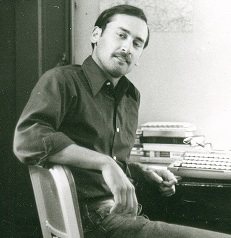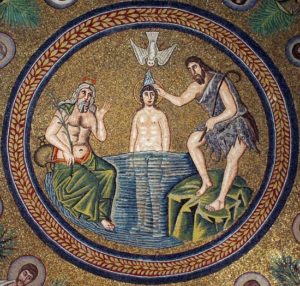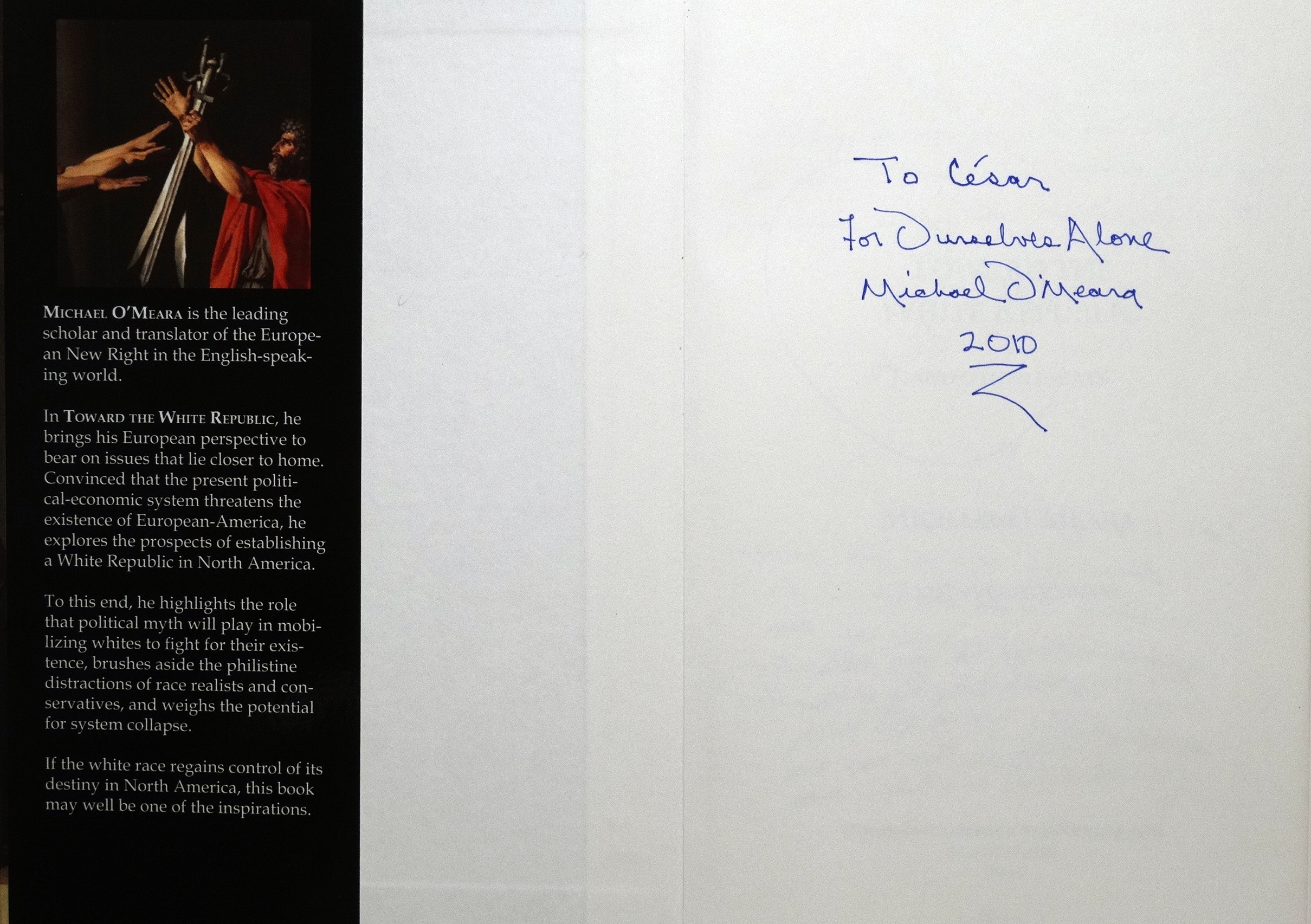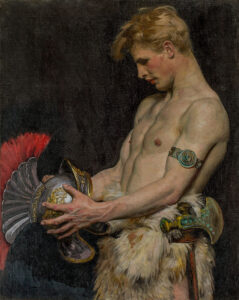by Michael O’Meara
Editor’s note: In yesterday’s post I mentioned Michael O’Meara. While it is true what I said about his Christian sympathies, as can be seen in the article below, this piece by O’Mearea from nearly a decade ago is surprisingly topical, and helps us understand what is going on these turbulent days.
Originally published in Counter-Currents on 7 October 2013 under the heading ‘Too Much Putin?’, it also helps us understand how that webzine’s editor, Greg Johnson, has (like Richard Spencer) betrayed the cause by taking the wrong side in the recent conflict in Ukraine. Unlike this pair, in the first paragraph my red emphasis on the author’s words indicates why I believe the issue of these days in Ukraine is of vital importance:
______ 卐 ______
US hegemony may be approaching its end. Once the world refuses to acknowledge the imperial authority of its humanitarian missiles, and thus stops paying tribute to its predatory model of the universe, then American power inevitably starts to decline—and not simply on the world stage, but also domestically, among the empire’s subjects, who in the course of the long descent will be forced to discover new ways to assert themselves.
Historically, America’s counter-civilizational system was an offshoot of the Second World War, specifically the US conquest of Europe — which made America, Inc. (Organized Jewry/Wall Street/the military-industrial complex) the key-holder not solely to the New Deal/War Deal’s Washingtonian Leviathan, but to its new world order: an updated successor to Disraeli’s money-making empire, upon which the sun never set.[1]
The prevailing race-mixing, nation-destroying globalization of the last two and a half decades, with its cosmopolitan fixation on money and commerce and its non-stop miscegenating brainwashing, is, as such, preeminently a product of this postwar system that emerged from the destruction of Central Europe and from America’s Jewish/capitalist-inspired extirpation of its European Christian roots.[2]
The fate of white America, it follows, is closely linked to the “order” the United States imposed on the “Free World” after 1945 and on the rest of the world after 1989. This was especially evident in the recent resistance of the American “people” to Obama’s flirtation with World War III—a resistance obviously emboldened by the mounting international resistance to Washington’s imperial arrogance, as it (this resistance) momentarily converged with the worldwide Aurora Movements resisting the scorched-earth campaigns associated with US power.[3]
* * *
Everyone on our side recognizes the ethnocidal implications of America’s world order, but few, I suspect, understand its civilizational implications as well as Russia’s Vladimir Putin.
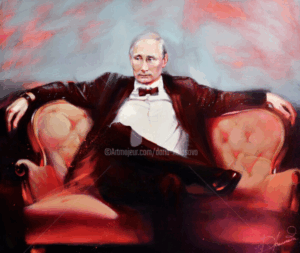
On September 19, barely a week after our brush with the Apocalypse, the Russian president delivered an address to the Valdai International Discussion Club (an international forum on Russia’s role in the world), which highlighted the extreme degree to which Putin’s vision of world order differs from that of Obama and the American establishment.[4] Indeed, Putin’s entire line of thought, in its grasp of the fundamental challenges of our age, is unlike anything to be found in the discourse of the Western political classes (though from the misleading reports in the MSM on his Valdai address this would never be known).[5]
Putin, to be sure, is no White Nationalist and thus no proponent of a racially-homogeneous ethnostate. This makes him like everyone else. Except Putin is not like everyone else, as we’ll see.
Certain East Europeans, instinctively anti-Russian, like our Cold War “conservatives,” refuse to appreciate Russia’s new international role because of historical grievances related to an earlier legacy of Tsarist or Soviet imperialism (though their grievances, they should know, bear little comparison to those “We Irish” hold against the English ruling class). In any case, such tribal grievances are not our concern, nor should they prevent the recognition that East Europeans and Russians, like Irish and English—and like all the national tribes belonging to that community of destiny distinct to the white man—share a common interest (a life-and-death interest) in being all prospective allies in the war against the globalist forces currently assaulting them in their native lands.
It’s not simply because Russia is anti-American that she is increasingly attractive to the conscious remnants of the European race in North America (though that might be reason enough). Rather it’s that Russia, in defying the globalist forces and reaffirming the primacy of her heritage and identity, stands today for principles that lend international legitimacy—and hence a modicum of power—to patriots everywhere resisting the enemies of their blood.
* * *
Qualitative differences of world-shaping consequence now clearly separate Russians and Americans on virtually every key issue of our age (more so than during the Cold War)—differences in my view that mark the divide between the forces of white preservation and those of white replacement, and, more generally, between the spirit of European man and the materialist, miscegenating depravity of the US system, which approaches the whole world as if it were a flawed and irredeemable version of itself.
In this sense, the decline of American global power and the rising credibility of Russia’s alternative model can only enhance the power of European Americans, increasing their capacity to remain true to their self-identity. US imperial decline might even eventually give them a chance to take back some of the power that decides who they are.
Putin’s discourse at the Valdai Club addressed issues (to paraphrase) related to the values underpinning Russia’s development, the global processes affecting Russian national identity, the kind of 21st-century world Russians want to see, and what they can contribute to this future.
His responses to these issues were historically momentous in being unlike anything in the West today. Cynics, of course, will dismiss his address as mere PR, though the Russian leader has a documented history of saying what he thinks—and thus ought not be judged like American politicians, who say only what’s on the teleprompter and then simply for the sake of spin and simulacra.
Foremost of Russia’s concerns, as Putin defined it in his address to the club’s plenary session, is “the problem of remaining Russian in a globalizing world hostile to national identity.” “For us (and I am talking about Russians and Russia), questions about who we are and who we want to be are increasingly prominent in our society.” In a word, Putin sees identitarianism as the central concern of Russia’s “state-civilization,” (something quite staggering when you consider that the very term [“identitarianism”] was hardly known outside France when I started translating it a decade ago). Identitarianism in the 21st century may even, as Putin implies, prove to be what nationalism and socialism were to the 20th century: the great alternative to liberal nihilism.
Like Bush, Clinton, or other US flim-flam artists, Obama could conceivably mouth a similar defense of national identity if the occasion demanded it, but never, not in a thousand years, could he share the sentiment motivating it, namely the sense that: “It is impossible to move forward without spiritual, cultural, and national self-determination. Without this we will not be able to withstand internal and external challenges, nor will we succeed in global competitions.”[6]
The operative term here is “spiritual, cultural and national self-determination”—not diversity, universalism, or some putative human right; not even money and missiles—for in Putin’s vision, Russia’s historical national, cultural, and spiritual identities are the alpha and omega of Russian policy. Without these identities and the spirit animating them, Russia would cease to be Russia; she would be nothing—except another clone of America’s supermarket culture. With her identity affirmed, as recent events suggest, Russia again becomes a great power in the world.
The question of self-determination is necessarily central to the anti-identitarianism of our global, boundary-destroying age. According to Putin, Russia’s national identity
is experiencing not only objective pressures stemming from globalisation, but also the consequences of the national catastrophes of the twentieth century, when we experienced the collapse of our state two different times [1917 and 1991]. The result was a devastating blow to our nation’s cultural and spiritual codes; we were faced with the disruption of traditions and the consonance of history, with the demoralisation of society, with a deficit of trust and responsibility. These are the root causes of many pressing problems we face.
Then, following the Soviet collapse of 1991, Putin says:
There was the illusion that a new national ideology, a development ideology [promoted by Wall Street and certain free-market economists with Jewish names], would simply appear by itself. The state, authorities, intellectual and political classes virtually rejected engaging in this work, all the more so since previous, semi-official ideology was hard to swallow. And in fact they were all simply afraid to even broach the subject. In addition, the lack of a national idea stemming from a national identity profited the quasi-colonial element of the elite—those determined to steal and remove capital, and who did not link their future to that of the country, the place where they earned their money.
Putin here has obviously drawn certain traditionalist conclusions from the failings of the former Communist experiment, as well as from capitalism’s present globalizing course.
A new national idea does not simply appear, nor does it develop according to market rules. A spontaneously constructed state and society does not work, and neither does mechanically copying other countries’ experiences. Such primitive borrowing and attempts to civilize Russia from abroad were not accepted by an absolute majority of our people. This is because the desire for independence and sovereignty in spiritual, ideological and foreign policy spheres is an integral part of our national character… [It’s an integral part of every true nation.]
The former Communist KGB officer (historical irony of historical ironies) stands here on the stump of that political/cultural resistance born in reaction to the French Revolution and its destruction of historical organisms.
In developing new strategies to preserve Russian identity in a rapidly changing world, Putin similarly rejects the tabula rasa contentions of the reigning liberalism, which holds that you can “flip or even kick the country’s future like a football, plunging into unbridled nihilism, consumerism, criticism of anything and everything…” Like Burke, he in effect condemns the “junta of robbers” seeking to rip the traditional social fabric for the sake of short term profit, as these money-grubbers prepare the very revolution they dred.
Programmatically, this means:
Russia’s sovereignty, independence and territorial integrity [against which America’s counter-civilizational system relentlessly schemes] are unconditional. These are red lines no one is allowed to cross. For all the differences in our views, debates about identity and about our national future are impossible unless their participants are patriotic.” [That is, only Russians, not Washington or New York, ought to have a say in determining who or what a Russian is.]
Self-criticism is necessary, but without a sense of self-worth, or love for our Fatherland, such criticism becomes humiliating and counterproductive. [These sorts of havoc-wreaking critiques are evident today in every Western land. Without loyalty to a heritage based on blood and spirit, Russians would be cast adrift in a historyless stream, like Americans and Europeans.] We must be proud of our history, and we have things to be proud of. Our entire, uncensored history must be a part of Russian identity. Without recognising this it is impossible to establish mutual trust and allow society to move forward…
The challenges to Russia’s identity, he specifies, are
linked to events taking place in the world [especially economic globalization and its accompanying destruction of traditional life]. Here there are both foreign policy and moral aspects. We can see how many of the Euro-Atlantic countries are actually rejecting their roots, including the Christian values that constitute the basis of Western civilisation. They are denying moral principles and all traditional identities: national, cultural, religious, and even sexual. They are implementing policies that equate large families with same-sex partnerships, belief in God with the belief in Satan.
The excesses of political correctness have reached the point where people are seriously talking about registering political parties whose aim is to promote paedophilia. People in many European countries are embarrassed or afraid to talk about their religious affiliations. Holidays are abolished or even called something different; their essence is hidden away, as is their moral foundation. And people [i.e., the Americans and their vassals] are aggressively trying to export this model all over the world. I am convinced that this opens a direct path to degradation and primitivism, resulting in a profound demographic and moral crisis. [Hence, the US-sponsored desecrations of Pussy Riot.]
What else but the loss of the ability to self-reproduce could act as the greatest testimony of the moral crisis facing a human society? Today almost all developed nations [infected with the system’s counter-civilizational ethos] are no longer able to reproduce themselves, even with the help of migration. Without the values embedded in Christianity and other world religions, without the standards of morality that have taken shape over millennia, people will inevitably lose their human dignity. We consider it natural and right to defend these values. One must respect every minority’s right to be different, but the rights of the majority must not be put into question.
Tolerant and pluralist though he is here, Putin nevertheless affirms the primacy of Russia herself. Our politicians get this 100 percent wrong, Putin only 50 percent—which puts him at the head of the class.
At the same time we see attempts to somehow revive a standardized [i.e., Americanized] model of a unipolar world and to blur the institutions of international law and national sovereignty. Such a unipolar, standardised world does not require sovereign states; it requires vassals. In a historical sense this amounts to a rejection of one’s own identity, of the God-given diversity of the world.
Russia agrees with those who believe that key decisions should be worked out on a collective basis, rather than at the discretion of and in the interests of certain countries or groups of countries. Russia believes that international law, not the right of the strong, must apply. And we believe that every country, every nation is not exceptional [as the Americans think they are], but unique, original, and benefits from equal rights, including the right to independently choose their own development path…
This is our conceptual outlook, and it follows from our own historical destiny and Russia’s role in global politics. [Instead, then, of succumbing to America’s suburban consumer culture and its larger dictates, Russia seeks to preserve her own identity and independence.]
Our present position has deep historical roots. Russia itself has evolved on the basis of diversity, harmony and balance, and brings such a balance to the international stage.
The grandeur of Putin’s assertion here has to be savored: against the latest marketing or policy scheme the US tries to impose on Russia, he advances his queen, pointing to a thousand years of Russian history, as he disperses America’s corrupting ploys with a dismissive smirk.
Though seeing Russia as a multiethnic/multi-confessional state that has historically recognized the rights of minorities, he insists she must remain Russian:
Russia—as philosopher Konstantin Leontyev vividly put it—has always evolved in ‘blossoming complexity’ as a state-civilisation, reinforced by the Russian people, Russian language, Russian culture, Russian Orthodox Church and the country’s other traditional religions. It is precisely the state-civilisation model that has shaped our state polity…
Thus it is that Russians, among other things, “must restore the role of great Russian culture and literature… to serve as the foundation for people’s personal identity, the source of their uniqueness, and their basis for understanding the national idea…” Following Yeats, he might have added that the arts dream of “what is to come,” providing Russians new ways of realizing or re-inventing themselves.
I want to stress again that without focusing our efforts on people’s education and health, creating mutual responsibility between the authorities and each individual, and establishing trust within society, we will be losers in the competition of history. Russia’s citizens must feel that they are the responsible owners of their country, region, hometown, property, belongings and their lives. A citizen is someone who is capable of independently managing his or her own affairs…
Think of how the “democratic” powers of the Americanosphere now hound and persecute whoever insists on managing his own affairs: e.g., Greece’s Golden Dawn.
The years after 1991 are often referred to as the post-Soviet era. We have lived through and overcome that turbulent, dramatic period. Russia has passed through these trials and tribulations and is returning to herself, to her own history, just as she did at other points in its history. [This forward-looking orientation rooted in a filial loyalty to the Russian past makes Putin something of an archeofuturist.] After consolidating our national identity, strengthening our roots, and remaining open and receptive to the best ideas and practices of the East and the West, we must and will move forward.
As an ethnonationalist concerned with the preservation and renaissance of my own people, I hope Russia succeeds not only in defending her national identity (and ideally that of others), but in breaking America’s anti-identitarian grip on Europe, so as to insure the possibility of a future Euro-Russian imperium federating the closely related white, Christian peoples, whose lands stretch from the Atlantic to the Urals.
But even barring this, Russia’s resistance to the ethnocidal forces of the US global system, will continue to play a major role in enabling European Americans trapped in the belly of the beast to better defend their own blood and spirit.
And even if Europeans should persist in their servility and the United States continues to lead its “mother soil and father culture” into the abyss, Russians under Putin will at least retain some chance of remaining themselves—which is something no mainstream American or European politician seeks for his people.
If only for this reason, I think there can never be “too much Putin,” as our Russophobes fear.
__________
Notes
[1] Desmond Fennell, Uncertain Dawn: Hiroshima and the Beginning of Post-Western Civilization(Dublin: Sanas, 1996); Julius Evola, “Disraeli the Jew and the Empire of the Shopkeepers” (1940).
[2] Boreas Rising: White Nationalism and the Geopolitics of the Paris-Berlin-Moscow Axis” (2005).
[3] Against the Armies of the Night: The Aurora Movements” (2010).
[4] President of Russia, “Address to the Valdai International Discussion Club” September 19, 2013. (I have made several grammatical and stylistic changes to the translation.)
[5] Much of my understanding of this comes from Dedefensa, “Poutine, la Russie et le sens de la crise” (September 23, 2013) at [broken link].
[6] Samuel P. Huntington was the last major representative of the US elite to uphold a view even vaguely affirmative of the nation’s historical culture—and he caught hell for it. See Who Are We? The Challenges to America’s National Identity(New York: Simon & Schuster, 2005).
